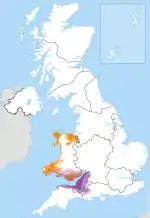Independent Television Service for Wales and the West
Independent Television Service for Wales and the West (ITSWW)[1] was a temporary emergency service provided by the Independent Television Authority (ITA) in light of the early termination of service of the previous franchise holder, Television Wales and the West (TWW) after they lost their ITV franchise in 1967.
 | |
 Reception areas of the two ITSWW services | |
| Type | Region of television network |
|---|---|
| Branding | Independent Television Service for South Wales and the West Independent Television Service Teledu Cymru |
| Country | England and Wales |
First air date | 4 March 1968 |
| TV transmitters | St Hilary, Preseli, Arfon, Moel-y-Parc |
| Headquarters | Bristol Cardiff |
Broadcast area | West of England Wales |
| Owner | An arrangement by the ITA where HTV used old TWW staff and facilities prior to becoming ready with its own franchise |
| Dissolved | 20 May 1968 |
Picture format | 405-line |
| Affiliation(s) | ITV |
| Language | English and Welsh |
| Replaced | TWW |
| Replaced by | Harlech Television |
Circumstances
In June 1967 the Independent Television Authority (ITA) had announced changes to the structure and contracts of the ITV network in the United Kingdom, to take effect in July 1968.[2] Several changes were announced that would have far-reaching effects for British television.[3] The UK press decided that the most dramatic news was the loss of the Wales and West contract,[4] held by TWW since 1958,[5] to a consortium headed by and named after Lord Harlech.[6]
TWW fought the ITA's decision, both formally and through the press.[7] However, the ITA remained resolute that it was legally entitled to remove any contract at any time for any reason,[8] and the board of TWW eventually accepted this and announced it would carry on providing a programme service to the area until the end of the contract period.
Problems with TWW
Standard regulatory practice at the time stated that the new incumbent of a licence should take on all available staff of the outgoing company.[9] However, the new licence holder, Harlech Television, intended to dismiss all the on-screen personnel of TWW, and launch with a fresh team.[10]
The board of TWW were advised not to take a stake in Harlech that was offered to them by the ITA, but this had the effect of depressing the company's share price.[11] It eventually became clear to the board that to raise the maximum amount of money for shareholders, they should "sell" the last part of the broadcast contract to Harlech. The ITA accepted this[1] and the sale went through for £500,000.[12][13] However, Harlech were not yet in a position to begin production and would therefore have to launch their promised new service using "in the can" TWW productions.
ITA solution
The ITA suggested Harlech would receive all the advertising revenue from the handover date, and pay TWW a fee to continue local production, while Harlech continued to prepare its own programmes for the original 31 July launch. The interim contract would use neither company's name, and the literal Independent Television Service for Wales and the West was chosen.
This created a cordon sanitaire between the end of TWW and the start of Harlech. Nevertheless, the "in the can" TWW productions, of which there were many, still carried "TWW presents" and "TWW production" captions.[1] The presentation retained TWW in-vision announcers,[10] giving the impression that little had changed. A temporary ident was designed, with four white horizontal bars shooting towards the viewer, electronic music and the name revealing itself a line at a time. The former TWW clock was retained. This was referred to in the local press as "TWW's revenge" on Harlech.[1] The situation lasted just under three months.
The ITSWW service was never referred to as such on air, but it continued both of the former TWW dual services under the names 'South Wales and West' and 'Teledu Cymru' – the latter having been the existing on-air name in that area. Both names were prefixed with the new phrase "Independent Television Service".[5] Extensive broadsheet press advertising was taken out to explain the arrangements to those viewers deemed to be interested. Nothing was placed in the tabloids.
See also
References
- "ITSWW - Album - Ident". Archived from the original on 26 February 2008. Retrieved 16 March 2008.
- Croston, Eric (ed.). "The Authority's Policy". ITV 1968. London: Independent Television Authority. p. 11.
- "BBC NEWS - Entertainment - TV and Radio - Timeline: 50 years of ITV". BBC News. 15 September 2005. Retrieved 16 March 2008.
- "Death of TWW". Retrieved 16 March 2008.
- "The List - GeoHistory". Archived from the original on 17 April 2008. Retrieved 16 March 2008.
- "The Harlech House of Graphics - The Early Years". Retrieved 16 March 2008.
- The Daily Telegraph, "'Capricious injustice' to TWW", 21 June 1967, quoted in Death of TWW: Telegraph 21/06/67, accessed 16 March 2008
- The Daily Telegraph, "Hill replies to Derby on TWW", 20 June 1967, quoted in Death of TWW: Telegraph 20/06/67, accessed 16 March 2008
- Hill (of Luton), Lord (Charles) (December 1967). "The Authority's Policy". In Croston, Eric (ed.). ITV 1968. London: Independent Television Authority. p. 12.
- "Iris Jones - TV Heroes". Archived from the original on 23 March 2008. Retrieved 16 March 2008.
- Wagner, R and Carrington J, The Times, "TWW worst hit as £11.3m is wiped off television shares", 13 June 1967, quoted in From the City: The Times 13/06/67 Photomusications (Transdiffusion), accessed 16 March 2008
- "TWW". Retrieved 16 March 2008.
- "TWW bows out-but at a price". The Times. No. 57171. 9 February 1968. p. 20.